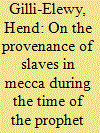|
|
|
Sort Order |
|
|
|
Items / Page
|
|
|
|
|
|
|
| Srl | Item |
| 1 |
ID:
152365


|
|
|
|
|
| Summary/Abstract |
There is hardly a source on early Islam that does not mention slaves in one way or another. They were ubiquitous companions of events, occasions, and incidences. But they played marginal roles in historical accounts. The numerous fragments of information, anecdotes, and offhand references concerning slaves during the rise of Islam call to be collected and analyzed to piece together a picture of various aspects of slavery during this period. References to slaves are especially prevalent in legal texts, as slaves provided useful cases to Muslim jurists to think through legal questions. The discussion of examples of slaves, walāʾ (clientele relationships), and manumission in hadith, exegesis, and jurisprudence has not only provided significant insight into the legal status of slaves, but has also helped scholars to develop a methodology for verifying and evaluating the source material itself. In this essay, I examine pieces of information available in historical and biographical works on early Islam to address the question of the provenance and procurement of slaves in Mecca, Medina, and the Hijaz during the time of the Prophet Muhammad. Reconstructing this story involves dealing with narratives transmitted in various short, spurious, and often unrelated accounts. The source material for early Islam is, as is often pointed out, problematic and at times contradictory. It is laced with topoi and leitmotifs, and frequently proves tendentious, reflecting the opinions and biases of those who wrote them more than what actually happened. Nevertheless, reading beyond the topoi, leitmotifs, and tendentiousness, we find that “in the Traditions there is an undeniable core of ‘fact’” with which we can work and assume to be valid until shown to be false.
|
|
|
|
|
|
|
|
|
|
|
|
|
|
|
|
|
|
|
|
|